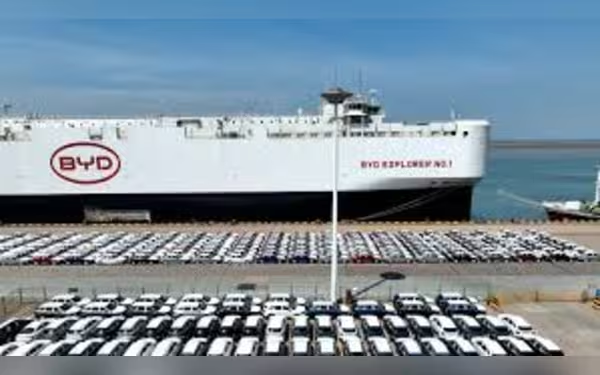Sunday, July 7, 2024 11:05 AM
European Commission imposes tariffs on Chinese EVs
- Additional tariffs imposed on Chinese electric vehicles by European Commission
- Concerns raised by German automakers over potential repercussions on exports to China
- Chinese EV manufacturers optimistic about prospects in Europe despite tariff hike
 Image Credits: thefrontierpost
Image Credits: thefrontierpostThe European Commission plans to impose additional tariffs on Chinese electric vehicles due to alleged excessive subsidies. This move has raised concerns among German automakers and may impact the broader economic and political landscape.
The European Commission has announced plans to impose additional tariffs on electric vehicles (EVs) manufactured in China. These tariffs, ranging from 17.4% on China-made BYD to 38.1% on SAIC, are in addition to the standard 10% duty. The reason behind this decision is the alleged excessive subsidies provided to these vehicles.
China's branded EVs have seen a significant increase in market share, from less than 1% in 2019 to 8% currently, with projections indicating a rise to 15% by 2025. However, the effectiveness of the Commission's tariff hike in addressing this issue remains uncertain.
German automakers like BMW have expressed concerns about potential repercussions on their exports to China if retaliatory measures are taken. The Chinese government has criticized the Commission's decision as protectionist and has hinted at taking appropriate actions in response.
The Commission's investigation into subsidies for Chinese EVs is ongoing, with the temporary tariff increase set to become permanent for five years upon the conclusion of the inquiry in November. This move has raised concerns within the European auto industry, particularly in Germany, which holds a significant share of the Chinese market.
While the tariffs aim to address subsidy issues, they may inadvertently impact German cars manufactured in China and exported to Europe. The Commission has outlined varying tariff rates based on cooperation with the investigation, with Chinese automakers seemingly less affected by the tariff escalation.
Chinese EV manufacturers, including Tesla, Geely, and BYD, remain optimistic about their prospects in Europe despite the tariff hike. Plans to establish production facilities in Europe are also being considered by Chinese EV-makers and suppliers.
The escalating economic tensions between Europe, America, and China are part of a broader economic and political landscape. These actions are seen as attempts to exert pressure on the Chinese economy amid geopolitical developments, including Russia's actions in Ukraine.
While tariff barriers are being raised to safeguard domestic markets, there are doubts about the efficacy of such measures. The West faces challenges in enhancing manufacturing capabilities to compete with China's cost-efficient production.
The historical context of Western countries contributing to China's economic growth through outsourcing manufacturing underscores the complexities of the current trade dynamics. Any abrupt shifts in Chinese manufacturing capacity could have global economic repercussions.













